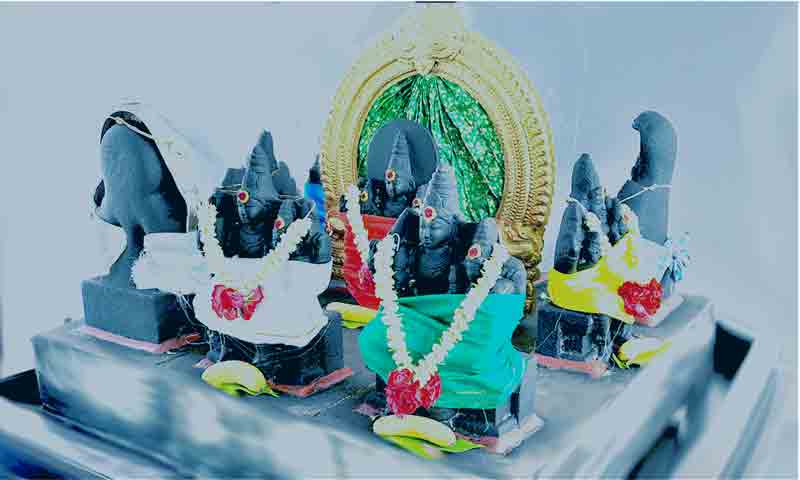
Prayers to Navagrahas, the Planetary Gods

Navagrahas installed in a temple
Guidelines for pronunciation are in the footnotes
Navagrahas, the nine planetary gods have a great significance in Hinduism, since they play an important role in influencing the destiny of individuals. According to Hindu beliefs a person's fate depends upon the planetary positions not only at the time his or her birth but also at various times when important events take place or when important works are undertaken. The Navagrahas are usually found installed together in most Hindu temples, and people worship them together. However, each of them also have specific temples built for them in various parts of India. Deities like Shani, Budha, Kuja are particularly worshipped by devotees to overcome misfortune and ward off evil influences. The following is a very powerful Navagraha prayer used by devotees to worship them collectively.
Navagraha Dhyana Slokas
the short version
aadithyaayacha somaaya |
mangalaaya budhaayacha |
guru
shukra shanibhyascha raahuve kethave namah ||
the longer version
japaakusuma samkaasham kaashyapeyam mahaadyuthim |
thamorim
sarva-paapaghnam pranathosmi divaakaram ||
dadhishankha thushaaraabham ksheerodaarnava sambhavam |
namaami shashinam somam shambhormakuta bhuushanam ||
dharaneegarbha sambhuutam vidyuthkaanthi samaprabham |
kumaaram shaktihastham tam mangalam pranamaamyaham ||
priyangu-kalikaa-shyaamam rupenan prathimam budham |
saumyam
saumyagunopetham tham budham pranamaamyaham ||
devaanancha rusheenaancha gurum kaanchana sannibham |
buddhimantham thrilokesam tham namaami brihaspathim ||
himakunda mrinaalaabham daithyaanaam paramam gurum |
sarvashaastra
pravkthaaram bhargavam pranamaamyaham ||
neelanjana samabhaasam raviputhram yamaagrajam |
chaayaa
maarthaanda sambhutham tham namaami sanaischaram ||
ardhakaayam mahaveeram chandraadithya vimardhanam |
simhikaagarbha
sambhuutham tham raahum pranamaamyaham ||
phalaasha pushpa samkaasham thaarakaa grahamasthakam |
raudram raudraathmakam ghoram tham kethum pranamaamyaham ||
Suggestions for Further Reading
- A Prayer During a Pradakshina at a A Hindu Temple
- Ganapathya Atharvashirsham
- Shri Ganesha Ashtotthara Sathanama Puja
- Everyday Prayers to Lord Ganesha
- Maha Ganesha Pancha-ratnam
- A Morning Prayer to Lord Ganesha
- Sankata-naasana Ganapathi Sthothram
- A Hindu Prayer, Ganeshashtakam
- Ganesha Shodhasa Naama Puuja
- Sri Krishna Ashtakam
- Sri Krishna Dvadasanama Sthothram
- Mahamrtyunjaya Mantram
- Navagraha Dhyana Slokam
- Popular Mantras and Prayers
- Salutations to Dikpalas, Rishis and Devathas
- Shani Shothram - A Prayer to Shani
- Popular Prayers of Shakti, Devi, Mother Goddess
- English Devotional Prayers to Hindu Gods and Goddesses
- Popular Prayers of Lord Ganesha
- Popular Prayers of Lord Krishna
- Popular Prayers of Goddess Lakshmi
- Navagraha Dhyana Slokam
- Popular Prayers of Vishnu
- The Dream and Despair of a Yogi
- The Idolaters - The Idol(H)aters
- Chidlren of Darkness - Kali Yuga
- Devotional Prayers to Lord Shiva
- The Vedas as the Source of Valid Knowledge
- Hymns from the Rig Veda
- The Meaning and Concept of Mantra in Hinduism
- Praying With the Right Attitude
- Why and How Should We Pray? The Prayer Purpose
- Essays On Dharma
- Esoteric Mystic Hinduism
- Introduction to Hinduism
- Hindu Way of Life
- Essays On Karma
- Hindu Rites and Rituals
- The Origin of The Sanskrit Language
- Symbolism in Hinduism
- Essays on The Upanishads
- Concepts of Hinduism
- Essays on Atman
- Hindu Festivals
- Spiritual Practice
- Right Living
- Yoga of Sorrow
- Happiness
- Mental Health
- Concepts of Buddhism
- General Essays
Guidelines to pronunciation: Sanskrit is essentially a language of sounds and sound vibrations. The efficacy of Sanskrit prayers depends upon the vibrations that are produced during chanting. It is difficult to transliterate Sanskrit words into English with full justification to the original sounds. In the above stated transliteration we followed a simple approach to make it easier even for those who are not familiar with English or Sanskrit. Wherever you find repeat vowels (aa, uu, ee) please stretch the vowel sound (for ex., aa as in vast or path, uu as in cool or root, ee as in eel or feel). Similarly, "ai" should be pronounced as in gait, fight, or tight. Th should be pronounced as in think or thick, but when t alone is used, it should be pronounced as in two, top or tip.